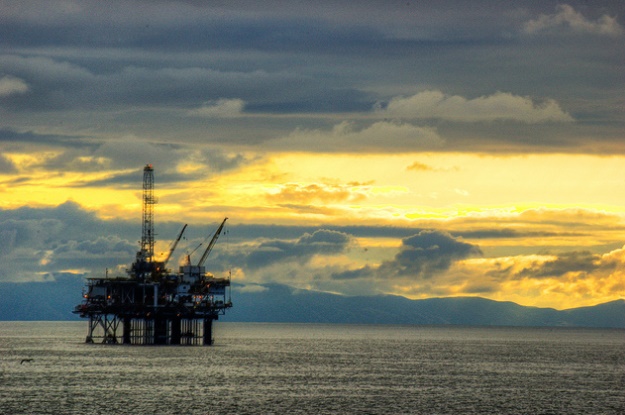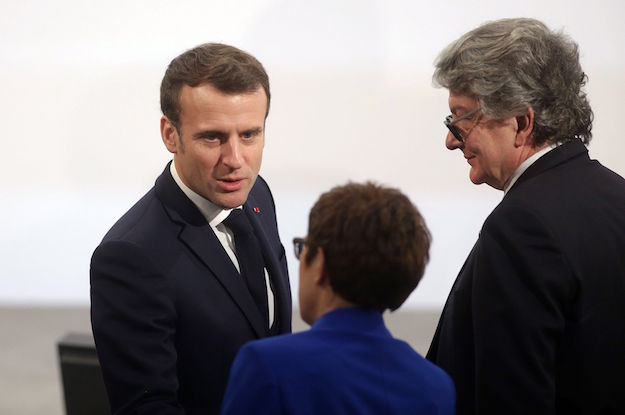After decades of standing by as neighbors Brazil and Argentina struck it rich in oil, Uruguay is getting into the action. Oil majors Total, ExxonMobil and Statoil are all making big investments in the tiny South American country, attracted by new projections that Uruguay may hold an “elephant” of an oil field.
Problem is, with oil currently below $50 per barrel, many companies are also slashing budgets and scaling back on global investment, which is threatening Uruguay’s efforts to join South America’s oil club. Potentially further depressing interest, local reports suggest Total’s drilling explorations have yet to yield promising results.
In an effort to keep investors interested, the Uruguayan government of President Tabaré Vázquez is taking a very business-friendly approach to oil policy. It has offered an 18-month extension to all exploration licenses awarded in a 2012 offshore auction, and energy officials are stressing that the nation’s oil sector will be uniquely stable in contrast to a region known for nationalizations and expropriations.
“The government extension and support was very helpful,” George Cazenove, spokesperson for London-based Tullow Oil, told AQ by email this week, adding that his company is now looking to complete another “major seismic acquisition in 2017” in Uruguay, with more details to come in July. “We are still very interested in Uruguay.”
Despite the fact that Uruguay has never commercially produced crude, some of the world’s largest oil companies are showing keen interest in exploring off the coast. France’s Total at the end of March began drilling an offshore well that will reach about 2,600 meters below the ocean floor, at a water depth of just over 3,400 meters – considered the deepest underwater well worldwide, a strong symbol of the distance Total is willing to go in search of what it expects will be a major oil discovery.
Known as Raya-1, the well is located in the Pelotas Basin in an area designated as Block 14. Total, which initially estimated drilling would last 100 days, will reportedly give an update within the next two weeks on their findings. Raya-1 is the first offshore well in Uruguay since Chevron drilled a pair of unsuccessful wells there in the 1970s. While Chevron hasn’t returned since, Total is by no means alone in now seeing potential in Uruguay.
US-based giant ExxonMobil entered the country in November with the purchase of a 35 percent stake in Total’s license to Block 14, which was originally sold in the 2012 auction organized by state energy company Ancap. Norway’s state producer Statoil joined the consortium in February, taking a 15 percent interest in the block from Total. That same month, the Norwegian firm acquired a 35 percent interest in an adjacent offshore area, Block 15, from Tullow Oil.
“Uruguay has been extremely successful in attracting many companies,” said Daniel Gerold, head of G&G Energy Consultants in Buenos Aires. “It may be that a couple of companies quit after the first phase, mainly due to the international crisis. But I don’t expect a massive retirement.”
While the industry’s big fish are mostly focused offshore, Total is also exploring two onshore blocks located in Uruguay’s extreme northern tip. Petrel Energy, a small company based in Australia, is also carrying out its own exploration campaign in two other onshore areas, Piedra Sola and Salto. Last year Ancap estimated that those two blocks alone could hold 910 million barrels of oil and 3.1 trillion cubic feet of natural gas. Petrel has said it plans to launch a four-well exploration program on its Uruguayan acreage.
Aside from geological potential, Uruguay is touting its stable investment climate as reason for oil majors to dig in. The ruling Frente Amplio (FA) has largely pursued investor-friendly policies, contrasting with leftist governments in neighboring Argentina and Brazil that veered toward protectionism in their oil sectors during the 2000s. At the same time, the well-established oil industries in Brazil and Argentina mean that oil companies in Uruguay can enjoy a nearby source for services and equipment.
Further boosting investor confidence in Uruguay, President Vázquez has sought to raise the professionalism of management at Ancap, which will take a minority stake in any oil project that moves to the development stage. He recently named Marta Jara Otero, a Uruguayan who was once head of Royal Dutch Shell’s Mexico operations, to run the company.
But then there’s the price of oil, which in January hit a 12-year low of $27.10 per barrel for global benchmark Brent. While prices have rebounded this year to around $50 a barrel, they are still below the threshold where many oil projects are profitable.
Uruguay’s government responded by last year approving the aforementioned 18-month extension on all licenses awarded as part of its 2012 offshore auction, which gives companies until mid-2017 to decide whether to continue exploring or return the blocks to Ancap. But not all firms have taken the bait. British oil major BP gave back three oil blocks last August to focus on “lower risk” projects around the globe. Others seem to be taking a wait-and-see approach.
“We are not commenting on how a decline in price may impact our strategic assessments on a country level,” Statoil spokesperson Knut Rostad told AQ by email. “We are approaching the industry’s cost and profitability challenges on a global level.”
Uruguay’s hope is that a recovery in oil prices – or perhaps a sizable discovery from Raya-1 – will encourage companies to stay the course and invest further. The same thinking goes for the country’s next offshore auction, which was initially planned for 2015 but was indefinitely postponed. Ancap has reportedly finished all technical work to launch an auction, but officials have said they’re waiting for oil to rebound and stabilize before selling more blocks.
Uruguay’s government, for its part, apparently believes that day is coming. President Vázquez in April presented a draft of a new hydrocarbons law that would create a new government body in charge of running oil and gas auctions, thus displacing Ancap from that role. And he is holding consultations with the country’s main political parties to discuss the outlines of a new national oil policy – one that will only be necessary, of course, if the companies now drilling in Uruguay actually make a commercial discovery.
“The key factor will be the results from the Total/Exxon well that’s being drilled,” said Gerold, the analyst. “If there are indications of hydrocarbons, that would be encouraging.”
—
Fargo is Latin America team leader at Energy Intelligence in New York. He writes regularly about oil and gas projects and energy policy throughout the region.
Additional reporting by Stephen Kurczy.







